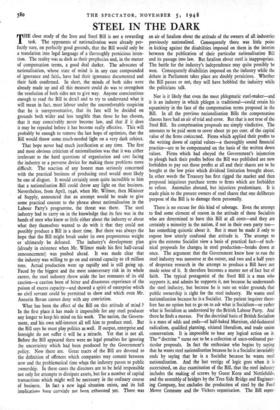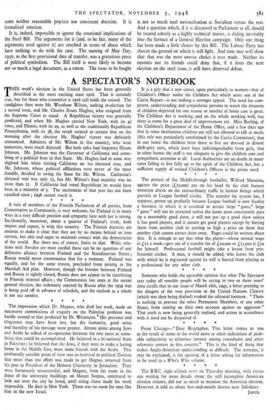STEEL IN THE DARK
THE close study of the Iron and Steel Bill is not a rewarding task. The opponents of nationalisation were already per- fectly sure, on perfectly good grounds, that the Bill would only be a translation into legal language of a thoroughly pernicious inten- tion. The reality was as dark as their prophecies and, in the matter of compensation terms, a good deal darker. The advocates of nationalisation, whose state of mind is in any case compounded of ignorance and faith,.have had their ignorance documented and their faith confirmed. In short, the minds of both sides -were already made up and all this measure could do was to strengthen the resolution of both sides not to give way. Anyone conscientious enough to read the Bill in detail and to try to understand what it will mean in fact, must labour under the uncomfortable suspicion that he is unrepresentative, that its fate will be decided on grounds both wider and less tangibk than those he has chosen, that it may conceivably never become law, and that if it does it may be repealed before it has become really effective.- This will probably be enough to remove the last hope of optimists, that the Bill would throw some much-needed light on a very dark subject.
That hope never had much justification at any time. The first and most obvious criticism of nationalisation was that it was either irrelevant to the hard questions of organisation and cost facing the industry or a perverse device for making those problems more difficult. The reaction of any honest man seriously concerned with the practical business of producing steel would most likely be one of disgust. It would certainly, seem quite incredible to him that a nationalisation Bill could throw any light on that business. Nevertheless, from April, 1946, when Mr. Wilmot, then Minister of Supply, announced that an attempt would be made to give some practical content to the phrase about nationalisation in the Labour Party's programme, the threat was there. The steel industry had to carry on in the knowledge that its fate was in the hands of men who knew so little either about the industry or about what they themselves wanted to do with it that they could not possibly produce a Bill in a short time. But there was always the hope that the Bill might break under its own preposterous weight or ultimately. be defeated. The industry's development plan (already in existence when Mr. Wilmot made his first half-casual announcement) was pushed ahead. It was made clear that the industry was willing to go on and extend capacity to 18 million tons. Actual production went up rapidly and is still going up. Faced by the biggest and the most unnecessary risk in its whole career, the steel industry, ,threw aside the last remnants of its old caution—a caution born of bitter and disastrous experience of the poison of excess capacity—and showed a spirit-of enterprise which no civil servant could be permitted to show and which even Mr; Aneurin Bevan cannot deny with any conviction. - What has been the effect of the Bill on this attitude of mind ? In the first place it has made it impossible for any steel producer any longer to keep his mind on his work. The nation, the Govern- ment, and his own self-interest all tell him to produce steel. But the Bill says he must play politics as,well. If output, enterprise and foresight do not suffer it will be a miracle. Yet that is not all. Before the Bill appeared there were no legal penalties for ignoring the uncertainty which had been produced by the Government's policy. Now there are. Great tracts of the Bill are devoted to the definition of offences which companies may commit between now and the problematical time when the industry passes to public ownership. In these cases the directors are to be held responsible not only for attempts to dissipate assets, but for a number of capital transactions which might well be necessary in the ordinary course of business. In fact a new legal situation exists, and its full implications have certainly not been exhausted yet. There was an air of fatalism about the attitude of the owners of all industries previously nationalised. Consequently there was little point in kicking against the disabilities imposed on them in the interim between the publication • of their particular nationalisation Bill and its passage into law. But fatalism about steel is inappropriate. The battle for the industry's independence may quite possibly be won. Consequently disabilities imposed on the industry while the debate in Parliament takes place are doubly pernicious. Whether the Bill passes or not, they will have hobbled the industry while the politicians talk.
Nor is it likely that even the most phlegmatic steel-maker—and it is an industry in which phlegm is traditional—could retain his equanimity in the face of the compensation terms proposed in the Bill. In all the previous nationalisation Bills the compensation clauses have had an air of trial and error. But that is not true of the Steel Bill. Its compensation proposals are simply vindictive. The amounts to be paid seem to cover about 5o per cent. of the capital value of the firms concerned. Firms whiCh applied their profits to the writing down of capital values—a thoroughly sound financial practice—are to be compensated on the basis of the written down values. Firms which had obeyed the Government's injunction to plough back their profits before the Bill was published are now forbidden to pay out those profits at all and their shares are to be bought at the low price which dividend limitation brought about. In other words the Treasury has first rigged the market and then proposed iniquitous purchase terms to firms which are forbidden to refuse. Anomalies abound, but injustices predominate. It is made plain to the present owners of steel shares that one deliberate purpose of the Bill is to damage them personally.
There is no excuse for this kind of sabotage. Even the attempt to find some element of reason in the attitude of those Socialists who are determined to have this Bill at all costs—and they are certainly a minority in the nation, if not in their own party too— has something quixotic about it. But it must be made if only to expose how utterly confused that attitude is. The attempt to give the extreme Socialist view a basis of practical fact—of tech- nical proposals for changes in steel production—breaks down at once. The argument that the Government. knew how to run the steel industry was nonsense at the outset, and two and a half years of desperate research -in- the attempt to produce a Bill have not made sense of it. It therefore becomes a matter not of fact but of faith. The typical protagonist of the Steel Bill is a man who supports it, and admits he supports it, not because he understands the steel industry, but because he is sure on wider grounds that public ownership is right for the steel industry. He wants steel nationalisation because he is a Socialist. The patient inquirer there- fore has no option bin to go on to ask what is Socialism—or rather what is Socialism as understood by the British Labour Party. And there he finds a morass. For the doctrinal basis of British Socialism is a mass of odds and ends—of half-baked Marxism, old-fashioned radicalism, qualified planning, vitiated liberalism, and trade union conservatism. It is impossible to base any logical action on it. The " doctrine " turns out to be a collection of unco-ordinated par- ticular proposals. In fact the enthusiast who begins by saying that he wants steel nationalisation because he is a Socialist invariably ends by saying that he is a Socialist because he wants steel nationalisation. And the last vestige of logic goes when it is ascertained, on due examination of the Bill, that the steel industry includes the making of screws by Guest Keen and Nettlefolds, and the assembly of bridges by the Tees Side Bridge and Engineer- ing Company, but excludes the production of steel by- the Ford Motor Company and the Vickers organisation. The Bill more- cents neither reasonable practice nor consistent doctrine. It is formalised emotion.
It is, indeed, impossible to ignore the emotional implications of the Steel Bill. The arguments for it (and, to be fair, many of the arguments used against it) are couched in terms of abuse which have nothing to do with the case. The naming of May Day, 1950, as the first provisional date of transfer, was a gratuitous piece of political symbolism. The Bill itself is most likely to become not so much a legal document, as a totem. The issue to be fought is not so much steel nationalisation as Socialism versus the rest. And a question which, if it is discussed in Parliament at all, should be treated soberly as a highly technical matter, is sliding inevitably into the furnace of a General Election campaign. Only one thing has been made a little clearer by this Bill. The Labour Party has chosen the ground on which it will fight. And time may well show that that was the most unwise choice it ever made. Neither its enemies nor its friends could deny that, if it loses the next election on the steel issue, it will have deserved defeat.











































 Previous page
Previous page